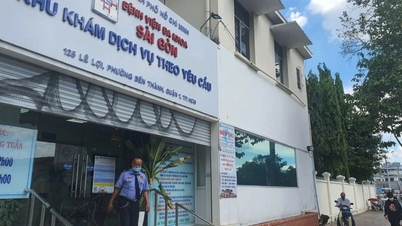
Master, Doctor Nguyen Hoai Vu, Department of Cardiology, Tam Anh General Hospital, Hanoi, said that Mr. VB was brought from the sports field to the hospital in a state of typical angina. The electrocardiogram recorded an acute ST-elevation myocardial infarction. Percutaneous coronary angiography (DSA) showed a blood clot completely blocking the coronary artery.
Taking the medical history, the patient had a history of smoking for many years, causing the atherosclerosis process to occur silently, but the patient did not detect it and receive appropriate treatment. In the coronary artery, there was an unstable atherosclerotic plaque - a "fragile" type of plaque containing a lot of cholesterol and a thin fibrous shell.
During strenuous exercise, specifically playing pickleball, this atherosclerotic plaque cracks, forming a thrombus (blood clot) that blocks the coronary artery and causes an acute myocardial infarction.
Immediately, the patient was transferred to the intervention room. The team performed stent placement in the right coronary artery under intravascular ultrasound (IVUS) guidance.
From the time of admission to the emergency department until the balloon was inflated to restore blood flow (door-to-balloon), the team took less than 30 minutes, significantly shortening the American Heart Association (AHA/ACC) recommended threshold of less than 90 minutes. Timely myocardial reperfusion helps reduce the risk of complications and preserve heart function.
The intervention was successful, the patient escaped critical condition, chest pain was gone, heart function was maintained with EF reaching 55%. After 1 week of monitoring, the patient's health was stable and he was discharged from the hospital.
Patients need to maintain regular medication use as prescribed by the doctor, exercise gently and can gradually increase the intensity, but should not rush back to high-intensity competitive sports such as pickleball until the cardiovascular condition is stable.
According to Dr. Vu, the patient, who was only 42 years old and had a heart attack, is quite young. In fact, even young people (men under 55 and women under 65 - the group with early onset of heart attacks), who appear healthy on the outside, are still at risk if there is a latent atherosclerotic plaque forming in the blood vessels.
In recent years, medicine has focused on the concept of “plaque vulnerability.” Even if the coronary artery is only mildly to moderately narrowed, if the plaque ruptures, the patient can still have a heart attack.
"About 60-70% of acute myocardial infarction cases originate from unstable lipid plaques. People with many cardiovascular risk factors such as smoking, high LDL-C, dyslipidemia, diabetes, obesity, lack of exercise... are highly likely to form this type of fragile plaque," said Dr. Vu.
However, it is not possible to determine with certainty who has unstable lipid plaques without examination using modern imaging techniques such as new-generation coronary CT, intravascular ultrasound (IVUS), or intravascular optical coherence tomography (OCT).
Dr. Vu recommends that people with cardiovascular risk factors need to be screened early through regular check-ups, blood lipid tests, electrocardiograms, echocardiograms, and coronary CT scans when indicated.
Maintaining a healthy lifestyle, eating a balanced diet, limiting saturated fat and refined sugar; exercising regularly at a moderate level, suitable for your physical condition, avoiding sudden exertion; controlling weight; not smoking... can significantly reduce the risk of myocardial infarction.
Pickleball games are fast-paced and require agility and flexibility in many directions. These sudden accelerations and changes in direction can cause the heart to work at high intensity in a short period of time, which is a factor that can cause arrhythmia or myocardial ischemia, especially in middle-aged and elderly people with underlying diseases.
Therefore, with high-intensity sports such as pickleball, soccer, tennis, etc., people with underlying cardiovascular disease and cardiovascular risk factors need to be evaluated before participating. This includes heart function testing, stress testing, or consulting a cardiologist to determine the appropriate level of exercise to prevent sudden cardiovascular events during exercise.
Source: https://nhandan.vn/nhoi-mau-co-tim-khi-dang-choi-pickleball-post915459.html


![[Photo] Conference of the Government Party Committee Standing Committee and the National Assembly Party Committee Standing Committee on the 10th Session, 15th National Assembly](https://vphoto.vietnam.vn/thumb/1200x675/vietnam/resource/IMAGE/2025/10/15/1760543205375_dsc-7128-jpg.webp)
![[Photo] General Secretary To Lam attends the 18th Hanoi Party Congress, term 2025-2030](https://vphoto.vietnam.vn/thumb/1200x675/vietnam/resource/IMAGE/2025/10/16/1760581023342_cover-0367-jpg.webp)






























![[Video] TripAdvisor honors many famous attractions of Ninh Binh](https://vphoto.vietnam.vn/thumb/402x226/vietnam/resource/IMAGE/2025/10/16/1760574721908_vinh-danh-ninh-binh-7368-jpg.webp)
































































Comment (0)